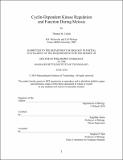Cyclin-Dependent Kinase regulation and function during meiosis
Author(s)
Carlile, Thomas M. (Thomas Marshal), Jr
DownloadFull printable version (53.95Mb)
Other Contributors
Massachusetts Institute of Technology. Dept. of Biology.
Advisor
Angelika Amon.
Terms of use
Metadata
Show full item recordAbstract
Meiosis is the process by which haploid gametes are produced from a diploid progenitor cell. Accurate completion of the meiotic divisions requires a variety of modifications to the mitotic chromosome segregation machinery, which allow the reductional meiotic chromosome segregation program to occur. Oscillations in the activity of Cyclin- Dependent Kinases (CDKs) drive virtually every event in the mitotic cell cycle, including events such as cell cycle entry, DNA replication, and chromosome segregation. While much is known about the activity of CDKs, the regulation of CDK activity, and the mechanisms by which CDK activity promotes cell cycle events during vegetative growth in Saccharomyces cerevisiae, relatively little is known about the roles of CDKs during the meiotic divisions. This work examines CDK activity during meiosis, the regulation of CDK activity during meiosis, and mechanisms by which CDKs regulate proper meiotic chromosome segregation. First, a striking diversity in Clb-CDK activity is observed during meiosis, including the identification of Clb1-CDK, and Clb3-CDK as meiosis I and meiosis II specific Clb-CDKs respectively. Second, Clb3 protein is shown to be restricted to meiosis II by translational control mediated by the 5'UTR of the CLB3 message. Finally, premature production of Clb3 results in the premature separation of sister-chromatids during meiosis I.
Description
Thesis (Ph. D.)--Massachusetts Institute of Technology, Dept. of Biology, 2010. This electronic version was submitted by the student author. The certified thesis is available in the Institute Archives and Special Collections. Cataloged from student submitted PDF version of thesis. Includes bibliographical references.
Date issued
2010Department
Massachusetts Institute of Technology. Department of BiologyPublisher
Massachusetts Institute of Technology
Keywords
Biology.